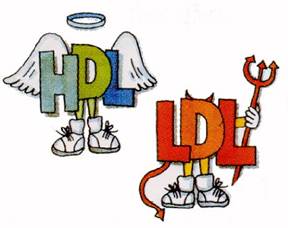
A vital organic molecule, cholesterol is an important structural component in creating Vitamin D, Bile Acids and steroid hormones within the human body. While in its simplest form cholesterol is a healthy compound, there are forms of cholesterol that are bad for you. A lot of the cholesterol that is consumed by the public is referred to as esterified cholesterol; an unhealthy and possibly fatal type of cholesterol.
Because it’s essential to the survival of pretty much all animal life, each cholesterol cell is broken down from other molecules. In a synthesis process referred to as a 37-step journey, the first protein that’s broken down is the enzyme HMG-CoA reductase. While true, cholesterol can also be broken down through another process call atherosclerosis.
Atherosclerosis is the process of how body fat and cholesterol travels to our blood stream. Another point, because of how much of our food is processed; most of the cholesterol that we ingest is bad for us.
Bad Cholesterol (LDL) vs. Good Cholesterol (HDL)
Considered the bad or unhealthy cholesterol, Low Density Lipoprotein (LDL) proves to cause many global health issues. This form of cholesterol is famous for clinging to the walls of your blood vessels; desperately trying not to let go. As the cholesterol continues to build, it can cause blockages in the atherosclerosis. As this continually happens, your risk of having a heart attack increases drastically.
Without proper medical care, the Low Density Lipoproteins will gradually build up over time, causing higher chances of risk. If the LDL cholesterol is not treated quickly, plaque will build up quickly; creating a bump on the artery. This can cause the LDL build up to happen at a quicker rate. The artery can become more inflamed as white blood cells flock to the potentially harmful area.
Of course, there is hope; not all cholesterol is bad. Known as the ‘good’ cholesterol, High Density Lipoprotein (HDL) serves to protect your body. Think of this type of cholesterol as the police of your body. Needed to fight and eliminate Low Density Lipoproteins, HDL cholesterol patrols the human body in search for all unhealthy forms of cholesterol. HDL will actually reduce the plaque build up in your arteries; creating a healthy way of living. HDL cholesterol is the protector of our blood vessels and their inner walls. It is one of our body’s on defense against fat and bad cholesterol.
Triglycerides
A common type of body fat, a triglyceride is broken down by the human body and used for energy. While triglycerides are essential for your body’s health, too many of them may lead to serious heart issues. To test your body’s triglyceride levels, a cholesterol level test is administered. Below are the healthy and unhealthy levels of triglycerides:
- Normal Level – 150 or less
- Medium/High Level – 150 – 199
- High Level – 200 – 499
- Very High Level – 500 or higher
Cholesterol Levels
In order to promote a healthy life, it is important to know your body; namely its
cholesterol levels. Depending on your age, race or gender, healthy cholesterol levels can vary. The number one killer among men, cholesterol must be taken seriously.
In order to maintain a healthy heart, men should maintain a cholesterol level of
200 mg/dL. If cholesterol levels rise over 240, the risk of heart related health
issues among men dramatically increase. Similarly, women should maintain a cholesterol level of 200 mg/Dl to decrease the risk of heart disease. Although women should sustain the same cholesterol levels as men, as the levels increase, women are less likely to develop a heart disease.
Different from men and women, cholesterol levels among children should be monitored. Because children are naturally smaller than adults, their healthy cholesterol is level is much smaller. For adolescents between the ages of 2-19, a healthy cholesterol level is 170 mg/dL. Cholesterol is measured in mg per dL of blood. An expert in cholesterol the National Cholesterol Education Program has an experienced board of professional that report different facts in regards to the youth and their appropriate cholesterol levels. Everyone between the ages of 2-17 should maintain a healthy cholesterol level of 170. Anything over this could let to present or future health issues.
